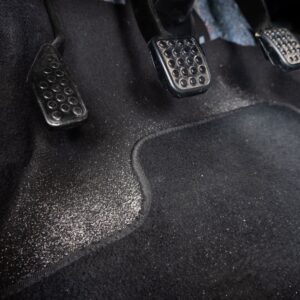As wonderful as technology is in this day and age, it can also be frightening in the wrong hands. While GPS trackers are meant to help you find your things more easily, more shady individuals might use them for other purposes.
Note that most new cars come with GPS tracking systems built in. GPS trackers are included on BMW and Mercedes-Benz to mainstream manufacturers like Chevrolet and Ford. These systems are primarily used for navigation and safety features, such as remote monitoring and theft prevention. What you don’t want is for some third party bad actor to put a GPS tracker on your car so they can keep up with where you go.
If you suspect someone’s put a GPS tracker on your car, here’s some information, along with tips and tricks, to help you find it.
Most new cars come with GPS tracking systems built in. GPS trackers are included on BMW and Mercedes-Benz to mainstream manufacturers like Chevrolet and Ford.
– Richard McCuistian, ASE Certified Master Automobile Technician
Car GPS Tracker Types
There are two GPS tracker types: real-time GPS trackers (active) and GPS data loggers (passive).
Those who use active GPS trackers can access their information remotely using the internet. Active GPS trackers use cellular towers to provide accurate location readings based on real-time data transmission and GPS location tracking.
Meanwhile, passive GPS trackers store all the location data they gather in an internal memory bank. The GPS owner will need to retrieve the tracker before viewing the information.
How To Detect a Tracker on Your Car
Now that you know what you might be facing, you can start to look for trackers around your vehicle.
Check the Exterior & Interior Thoroughly
Having a quick look around your car isn’t enough. Some trackers are small and difficult to see. Trackers can even be smaller than 2 by 2 inches. That means you need to be thorough.
Exterior
Using a flashlight and a mirror, examine your vehicle’s exterior. Wheel wells and the undercarriage are easy places to hide trackers. Check your exhaust pipe as well. If the tracker planter was in a hurry, they likely put it somewhere easy to reach, but don’t rule out more difficult-to-reach places if you’ve previously left your vehicle parked unattended for long periods.
Interior
Check your vehicle’s data port to see if there’s a tracker plugged in. Also examine the glove compartment, under the seats, and in the trunk. You might also want to consider cleaning your vehicle in case the tracker’s been hidden in some clutter.
Don’t only rely on your eyes. You can use your ears to pick up tracker beeps as well. Some GPS trackers, like Apple AirTags, have built-in programs to alert others of their presence, usually by beeping once they’ve been far away from their owner for 8 to 24 hours. This is to deter anyone from using these trackers to stalk or follow people.
Use a GPS Detector App or a Bug Sweeper
Apple and Android both have apps for detecting certain trackers. The Apple AirTag is a particularly hot topic when it comes to unwanted tracking. If you’re using iOS, you can use the Find My app to locate nearby AirTags. Linking them to your app will help you find out where you first picked them up. The alternatives for Android users are Tracker Detect and Scan & Secure.
You can also opt to buy an electronic bug sweeper instead. These handheld devices detect electromagnetic signals and can help you find any GPS trackers in your car. You can walk around your vehicle slowly with the sweeper in hand and do a closer, more thorough sweep with it in areas you think a tracker might be hiding.
Install Security Systems
You might consider installing a GPS signal blocker or jammer, but remember that these devices are illegal in the US. Avoid using them. Instead, install an automotive security system. These systems can help you safeguard your vehicle. If the system comes with recording features, you can record a potential stalker planting a GPS tracker and bring the evidence to the police.
What To Do If You Find a GPS Tracker in Your Car
If the tracker in your car was left there entirely by accident, you can notify the owner using the tracking apps we mentioned. They can track it without you handing it over in person, so if you’re uncomfortable, simply shoot them a message and leave the tracker somewhere they can find.
On the other hand, if a tracker was maliciously left in your car, it’s time to contact the authorities and retreat somewhere safe. Returning home isn’t safe if you’re worried about leading your tracker to your address. Go to a public area and wait for the police to arrive. Hold on to the tracker and hand it in as evidence.
Is Tracking a Car With a GPS Tracker Legal?
All 50 states outlaw using a GPS car tracker device on a vehicle you don’t own. In fact, even the police need a warrant to use a GPS tracker on a suspect’s car. Now that you know how to detect a car tracker, you can find out if you’re being illegally tracked. Reach out to the proper authorities right away if you find an unwanted GPS tracker in your vehicle.
Any information provided on this Website is for informational purposes only and is not intended to replace consultation with a professional mechanic. The accuracy and timeliness of the information may change from the time of publication.


























